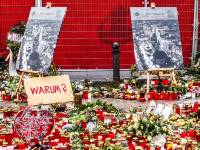The radical Islam urges increasingly towards German.
2017-07-01 / 2017-07-14
(PDFs will be reworked and become available soon)
To understand the terror attacks in Germany, to recognize the increasing threat by terror, and to counter this development vigorously an in-depth view towards Central Asia seems the appropriate first measure. The objective is to prevent further terror attacks such as the one on the “Weihnachtsmarkt” in Berlin in December 2016. Germany had the opportunity to prevent such an attack at the time and it has it even more today.
Germany repatriates an increasing number of refugees back to their countries. Some Federal States of Germany as well as several NGOs oppose to the repatriation of refugees, in particular to Afghanistan. However, the stated criteria how safe – or unsafe in this case – Afghanistan and the capital Kabul might be misses out on many levels. The situation in most countries and in Afghanistan in particular is much more complex and unclear than stated by either of the involved parties.
The long standing acts of war, manifested essentially in the proxy war in Afghanistan between the USA and Russia, caused hundreds of thousands casualties. Millions paralyzed people were left behind and millions were displaced from their hometowns. Despite the heavily armed presence of the USA and its allies in the region with the objective to dominate the Middle East, no sign of eradication of the radical Islam is witnessed. The radical Islamic movements (Al-Qaida, Taliban, Lashkar-Tuiba and others) rather got robust and are beyond the termination.
The proxy war in Afghanistan appears to be more dangerous than during the times of the Cold War. The rising sectarian movements and ethnic aspects are additional and crucial circumstances. In combination, this leads to a rising willingness of the Afghans to fight against each other: We have to get ready for a prolonged war in the country. Several reliable sources – such as Lieutenant General Rainer Glatz, Major General Markus Kneip and some from the Militärischen Abschirmdienst MAD – state the IS establishes a new front in northern Afghanistan. Markus Gruebel (Member of the German Federal Parliament and the Defence Committee) indicated in a private conversation that his information recounts the ISIS in Afghanistan being an independent movement and not being controlled by the Arab ISIS.
Some situational reports describe Russia and its allies support Shiite Islam to fight the IS. On the other side Saudi Arabia and its allies hold up the IS to brawl Russian and Iranian proxies in the country. This means, Saudi Arabia – the strategic partner of America, Qatar, UAE and Turkey – seek to bring the Middle East conflict to Afghanistan. Furthermore, Pakistan supports Pashtons, India supports Tajiks and Baluches, they endeavor to fetch the Kashmir inconsistency to the country. This leads to the conclusion the West and its strategic allies of the Islamic world uses the ISIS and Taliban as Trojan horses in order to contain Russia. According to intelligence information, the Badakhshan province in the north of Afghanistan will be established as the de-facto capital of ISIS which would boil down a race between West and Russian in Afghanistan.
The Afghan political and security situations, especially in the northern Afghanistan, dramatically deteriorated when ISIS started its exodus from eastern parts of Afghanistan to the northern components of the country. Recently Taliban, Haqani Network, Al-Qaida and ISIS have doubled their combined offensive attacks and gaining more territories and Kabul regime and its international allies losing grounds day by day. The peace talks have had no satisfactory effects: The motor vehicle attack in December 2016 on the German consulate in Mazar-e-Sharif killed eight Afghan civilians and wounded hundreds of them. The day after, the Bundeswehr murdered two civilians. The incident indicates that how far is to reach a peaceful deal. Despite the ISIS proclaiming being responsible for this attack, several sources come to the conclusion the ISIS was not able to execute this attack on its own. Expanding its traditional area of operation towards the Middle East, Africa, southern Central Asia, Eastern Europe and the Balkan might rather be the reason for the attack against Germany.
The approximation of the German Troops towards the Russian territory and its allies is perceived as the exertion of pressure on the national interests and national security of the latter. Germany untraditionally has committed troops to Afghanistan, South-Sudan, Somalia, Eastern Europe, and recently to Syria to train Kurdish militia to simultaneously fight the Assad regime and ISIS. This exposes the German citizen, German NGOs and diplomatic entities to much higher risk – they are perceived as targets by terrorists. Furthermore, Germany has followed the foot-steps of the USA – since Summer 2017 also China – in the world affairs. Meanwhile it has signed a number of arm deals with Saudi-Arabia and other Gulf states, they have all made the country to be more susceptible to terrorist counterattacks.
This development does not come as a surprise to German military strategists and neither does it to the author of this report, Ajmal Sohail (Counter Terrorism Specialist, read below). He has expressed his concerns in fall 2016 to the German authorities and representatives of the Ministry of Defense: The changes in the foreign policy of Germany will cause counter measures. His concerns did not gain recognition; the German authorities were convinced they are well prepared for such attacks. This appraisement by Germany has been proven wrong by the very tragic attack in Berlin.
In Afghanistan, and other countries in the Near East and Africa, hundreds of thousand people still are displaced. Kabul too is under compulsion. Corruptions, jobbery nepotism, injustice and the lack of employment potential urges the people of Afghanistan straight into the arms of terrorist, e.g. to the Taliban, ISIS and Al-Qaida in Afghanistan – resulting in an increased threat of terror in Germany. Thousands of young people flee to the EU, sometimes a second time to the EU, and namely Germany, in search for a livable future. Together with the refuges come also terrorists – thus increasing the danger of terror attack in Germany.
Germany orientates itself towards the USA. At the same time arms deals with Saudi Arabia and other Gulf States were signed, thus increasing the danger for counter measures against Germany. Afghanistan needs candidly a comprehensive political settlement, which is – despite the reiteration by Angela Merkel and the former American president Barak Husain Obama on November 17, 2016, – unfortunately far from to be attained. As long as the new American Administration, by strong leadership, does not change the recent situation in Afghanistan, the Afghan government will not be able to take over its leading role in collaboration, trade, diplomacy and business. If America will not invigorate its strategy for the region, the Afghan built/US-supported Kabul regime will collapse. The American “tie-binding strategy” will really be at risk, at the same time putting the USA and Germany at increasing risk of terror.
How can Germany counter the increasing threat by terror in its country, and Europe?
The repatriation of refugees – to Afghanistan, for example – results in some relieve to the German apparatus for refugees, which is fully under stress. The saved money is released to support the real and hunted refugees.
As long as the repatriated refugees find themselves in such a devastating, hostile and futureless situation in their home countries, thy will be urged straight into the arms of radical and sectarian groups. In lack of other opportunities, the Afghan refugees often end up in the production, processing and distribution of drugs – from which the terror e.g. in Afghanistan and other target countries is financed of. Due to their knowledge, experience and cognition of places and languages such repatriated refugees are ideal to establish and run drug distributions – besides planning, preparing and sometimes even executing terror attacks in Europe and Germany.
For the future and safety of Germany, it appears to be of eminent importance Angela Merkel initiates actions following her commitment for Afghanistan from November 17, 2016. The democratization of the country and setting up an education system are as crucial as building up the infrastructure and fighting corruption. It will be in the hands of Germany to recognize its strengthened position in world politics and to profit together with its equally strengthened partners. As soon as the populations as well as the repatriated refugees have proper perspective in Afghanistan, the drug business and the terrorists will no longer find angry young men and women they can abuse for their own purposes.

